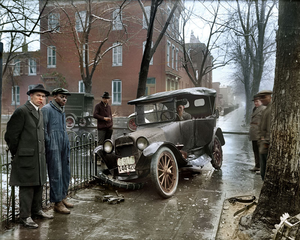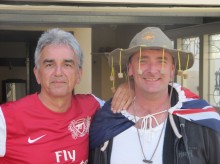Treatment staff and her peers help Natalie find a path to recovery from heroin addiction. A confronting situation years later, when she is a treatment practitioner, helps Natalie realise that she is still traumatised from her childhood experiences. A second recovery journey begins. (10,923 words)
‘My Recovery: A Seminar Opening Speech’ by Adam Brookes
 It’s amazing to think that Adam Brookes and I have now been great friends for over ten years, although we’ve been on opposite sides of the world for much of that time. Not any more! Here is a blog concerning Adam that I wrote back in May 2013.
It’s amazing to think that Adam Brookes and I have now been great friends for over ten years, although we’ve been on opposite sides of the world for much of that time. Not any more! Here is a blog concerning Adam that I wrote back in May 2013.
I first met Adam back in 2010 and he quickly became someone very important in my life, a really good friend. He was close to my partner Linda and to my three youngest children who were living with us at the time. I saw that Adam had that something special, that empathic and caring nature that helps people get better. I knew that he was going to help many people.
Adam spent a number of years living in the U.K., but now lives happily in New Zealand. Here is a five-minute speech that he gave to open the Fresh Start Recovery Seminar in Perth in July 2011. Wow, over ten years ago!
Classic Blog: ‘Learning Leadership: How to become a leader in the NHS’ by Professor Aidan Halligan
I’m watching again the excellent BBC TV series from the 1990s, Cardiac Arrest, and it reminded me of this film clip. Time to put it up again.
‘Aidan Halligan, Professor of Foetal and Maternal Medicine and Director of Education at UCL reflects on his experiences of being a leader in the NHS. He shares the stories of people he respects as leaders, and analyses the key features that make them so effective.
Leadership is “… going into the unknown with courage. People respect courage and they respect compassion.”
“We know when we see a leader. They inspire us and when we’re inspired we become determined. And when we are determined we go further. That’s what leadership is about… And it’s your example that counts, not your rank. And if you care about patients to the point of being selfless, people will always respect that.”
‘7 Ways to Practice Positivity and Optimism Every Day’ by Faisal Hoque
 Helpful blog from the Huffington Post which links to some other very good blogs.
Helpful blog from the Huffington Post which links to some other very good blogs.
By now the benefits of positive thinking are well established. Sages, psychologists, neuroscientists, researchers and doctors all have been espousing the benefits of positive thinking for hundreds of years.
Positive thinking helps us to be healthier, more productive and ultimately happier. Yet for most of us it is hard to practice optimism on a regular basis.
‘Relieving the states that make life miserable… has made building the states that make life worth living less of a priority. The time has finally arrived for a science that seeks to understand positive emotion, build strength and virtue, and provide guideposts for finding what Aristotle called the ‘good life.’ Dr. Martin Seligman
‘Learning Leadership: How to become a leader in the NHS’ by Professor Aidan Halligan
Aidan Halligan, Professor of Foetal and Maternal Medicine and Director of Education at UCL reflects on his experiences of being a leader in the NHS. He shares the stories of people he respects as leaders, and analyses the key features that make them so effective.
Leadership is “… going into the unknown with courage. People respect courage and they respect compassion.”
“We know when we see a leader. They inspire us and when we’re inspired we become determined. And when we are determined we go further. That’s what leadership is about… And it’s your example that counts, not your rank. And if you care about patients to the point of being selfless, people will always respect that.”
‘What is self-compassion?’ by Kristin Neff
 Some of you will have seen Kristin Neff’s video on self-compassion on this website. Here is how Kristin defines self-compassion:
Some of you will have seen Kristin Neff’s video on self-compassion on this website. Here is how Kristin defines self-compassion:
‘Having compassion for oneself is really no different than having compassion for others. Think about what the experience of compassion feels like.
First, to have compassion for others you must notice that they are suffering. If you ignore that homeless person on the street, you can’t feel compassion for how difficult his or her experience is.
‘Self-Compassion’ by Kristin Neff
‘… and you forget to say, “This is really difficult, this is really stressful. I need some soothing and comforting”. Most people forget that they need to give that to themselves.’
Self-compassion is not just essential for recovery, but also just for life in general. Kristin Neff, a leading expert in the ‘field’ of self-compassion, has a wonderful website on the topic.
Here is the first in a series of introductory videos on self-compassion that Kristin has made. You can link to the other videos from the YouTube page that this video is on.
‘A Caregiver’s Story – And How I Became an Addict’ by Madeline Goldstein
 Addiction to prescription drugs is a huge, but often ignored, problem. I’ll be focusing on recovering from prescription drug addiction over the coming weeks. Here’s a moving Recovery Story for starters, from the Mad in America community website.
Addiction to prescription drugs is a huge, but often ignored, problem. I’ll be focusing on recovering from prescription drug addiction over the coming weeks. Here’s a moving Recovery Story for starters, from the Mad in America community website.
‘“There are only four kinds of people in this world – those who have been caregivers, those who currently are caregivers, those who will be caregivers and those who need caregivers.” Former First Lady Rosalynn Carter
In 1994, my nineteen-year old daughter, Cristina, was diagnosed with chronic myelogenous leukemia (CML). It was a diagnosis that came totally out of the blue and as a complete shock.
20 Things to Start Doing in Your Relationships
 Relationships are key in recovery. So let’s look at some things that will facilitate healthy relationships, from Marc and Angel Hack Life.
Relationships are key in recovery. So let’s look at some things that will facilitate healthy relationships, from Marc and Angel Hack Life.
‘Family isn’t always blood. They’re the people in your life who appreciate having you in theirs – the ones who encourage you to improve in healthy and exciting ways, and who not only embrace who you are now, but also embrace and embody who you want to be. These people – your real family – are the ones who truly matter.
Here are twenty tips to help you find and foster these special relationships.
1. Free yourself from negative people. Spend time with nice people who are smart, driven and likeminded. Relationships should help you, not hurt you. Surround yourself with people who reflect the person you want to be. Choose friends who you are proud to know, people you admire, who love and respect you – people who make your day a little brighter simply by being in it.
‘Coaching, cajoling, caring: All good for recovery’ by Peapod
 Peapod was the top blogger on Wired In To Recovery before retiring. Here is a snappy piece on peer-based support, originally published in March 2011.
Peapod was the top blogger on Wired In To Recovery before retiring. Here is a snappy piece on peer-based support, originally published in March 2011.
‘What do people in recovery remember as the key things that helped us initiate and then maintain the recovery journey? Do we remember the doctor getting our medication dose just right? Do we remember a brilliant care plan? Do we remember diaries and charts and exercises? Probably not.
What I remember are the people on my path. The person who answered the phone in my hour of need and who listened; the kindness and wisdom of the staff in the treatment centre; the warmth and practical help shown me when I had very little to draw on and didn’t know where to turn. Sometimes people supporting me cared enough to be honest and told me things I didn’t particularly want to hear.
‘Powering America’ by John McKnight
 I want to follow up John McKnight’s video from the other day with one of his blogs, from March 2011.
I want to follow up John McKnight’s video from the other day with one of his blogs, from March 2011.
‘In a neighborhood, people are empowered by the work they do together. Often, they use this power to confront institutions and advocate for the neighborhood’s self-interest. In this kind of action, power is understood as our ability to get someone else to do something for us. This is the consumer power of confrontation.
The other kind of neighborhood power results when we come together to create something for ourselves – from ourselves. This is the power of citizens engaged in community building.
‘My Recovery: A seminar opening speech’ by Adam
 Some of you in Perth will remember Adam Brookes. I met Adam a few years ago and he quickly became someone very important in my life, a really good friend. Adam is more than that, he is like part of my family. My children love him and my partner Linda feels very close to him.
Some of you in Perth will remember Adam Brookes. I met Adam a few years ago and he quickly became someone very important in my life, a really good friend. Adam is more than that, he is like part of my family. My children love him and my partner Linda feels very close to him.
I also saw that Adam had that something special, that empathic and caring nature that helps people get better. I knew that he was going to help many people.
Here is a 5-minute speech that Adam gave to open the Fresh Start Recovery Seminar in Perth in July 2011. He also blogged this on Wired In To Recovery.


